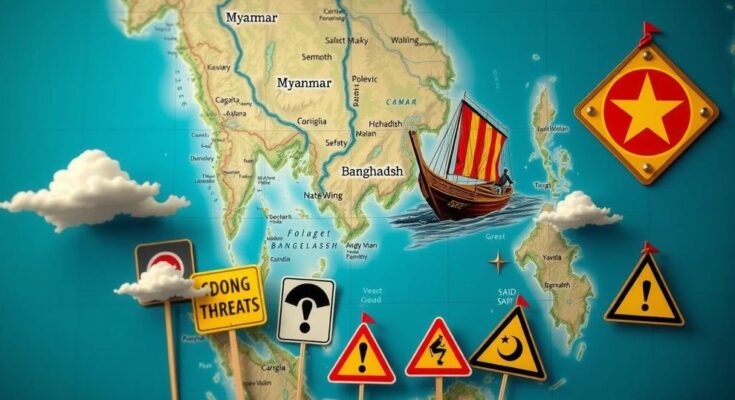The Rohingya community is experiencing a devastating resurgence of violence, prompting urgent calls for international support. As clashes between the Myanmar military and the Arakan Army harm civilians, thousands are fleeing to Bangladesh, facing inadequate aid and possible refoulement. Reports of severe human rights violations compound their plight, highlighting the need for immediate humanitarian assistance and protection strategies.
Newly arrived Rohingya refugees in Bangladesh urgently require food, shelter, and medical aid after fleeing severe violence since the 2017 military-led crackdown. Organizations like Amnesty International highlight testimony from families caught amidst conflicts between the Myanmar military and the Arakan Army, which has led to mass displacements. Hundreds of thousands are currently internally displaced or waiting to enter Bangladesh, reiterating a tragic cycle of violence reminiscent of the past exodus. With the 2021 military coup exacerbating conditions, Myanmar’s military has reportedly killed over 5,000 civilians, with indiscriminate air strikes continuing to threaten lives. Spurred by the Arakan Army’s counter-offensive since November 2023, attacks on Rakhine State have intensified, pushing many Rohingya to seek refuge in Bangladesh. Yet, those making it to refugee camps face dire shortages, leaving them vulnerable without adequate supplies or services. Survivors recount harrowing experiences of violence, revealing that they are being persecuted from both the military and rebel groups. “Once again, the Rohingya people are being driven from their homes and dying in scenes tragically reminiscent of the 2017 exodus.” said Agnès Callamard of Amnesty International. The devastation caused by recent conflicts echoes the trauma of previous displacements. Bangladesh authorities have reportedly forced many Rohingya back to Myanmar, violating international protection principles. Refugees live in fear of deportation and express their urgent need for access to basic services amidst worsening security conditions in camps. Many lack proper registration with aid agencies, leading to hunger and a constant sense of danger from armed groups intertwined in the Rohingya struggle. Amnesty officials urge that the interim Bangladesh government and humanitarian organizations must collaborate for adequate resource distribution and support for refugees. Callamard emphasizes, “Bangladesh must also ensure that it does not forcibly return people to escalating conflict.” As tensions in Rakhine State escalate, the well-being of Rohingya refugees hangs in the balance, highlighting the need for immediate intervention from the international community. Recommendations include increased international funding and a humanitarian response to alleviate the plight of those living in refugee camps. Both the Myanmar military and the Arakan Army are called upon to uphold international humanitarian laws amidst their ongoing conflict, ensuring civilians are protected as violence endures in this troubled region.
The ongoing crisis for the Rohingya community has deep roots in a history of persecution, particularly following the crackdown initiated by Myanmar’s military in 2017. This latest chapter, marked by intensified fighting between the Myanmar military and the Arakan Army, reveals a dire humanitarian situation as thousands attempt to flee across borders into Bangladesh seeking safety and aid. The impact of the military coup in Myanmar and its implications for human rights amplify the urgency for international intervention and support for this vulnerable population.
The Rohingya community faces grave threats from both military and insurgent forces, forcing them to flee their homes and endure harrowing experiences in temporary refuges. With thousands displaced and aid desperately needed, the situation remains critical. Advocacy for their rights and protection is essential, alongside ensuring that refugees in Bangladesh are not forcibly returned to a conflict zone. The international community’s proactive engagement is crucial to address these humanitarian needs.
Original Source: www.amnesty.org



